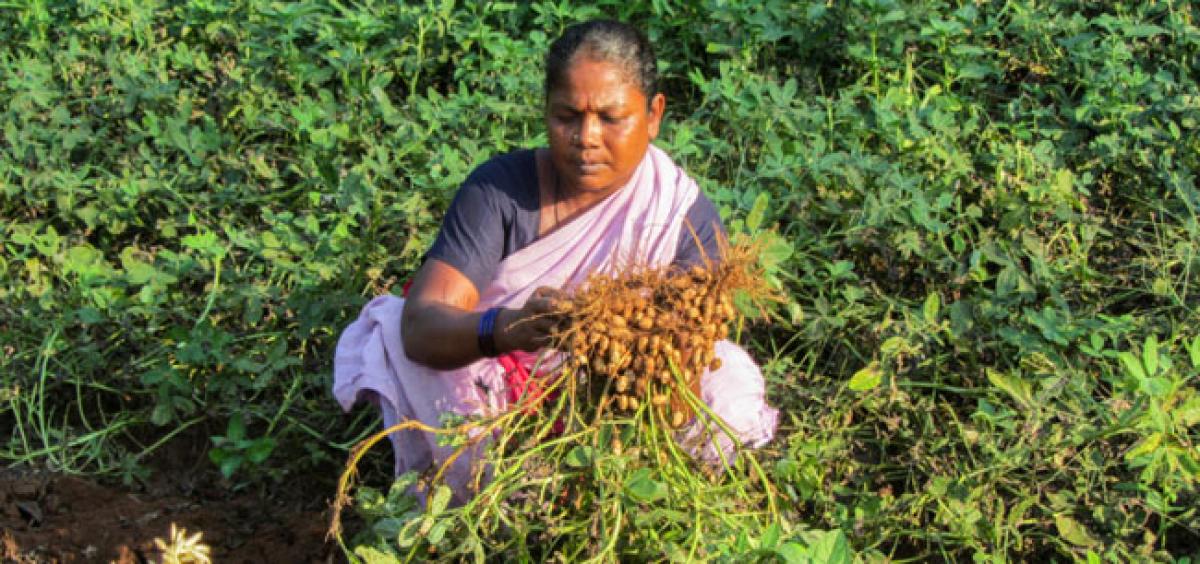Live
- Special trains for the Maha Kumbh Mela from January 5
- Tribal leader Vaba Yogi nominated as DVMC member
- Ola Electric expands network
- NRI deposits soar $11.9 bn in 7 mths
- Positive outlook on FDI inflows in 2025
- EY forecasts 6.5% GDP growth for FY25
- Chicco opens new store
- DPIIT-recognised startups over 1.57 lakh
- Gunfight between armed groups in Imphal village
- Road blockade in Pak: 100 kids die awaiting aid
Just In

Hopelessness and stark poverty was ruling the roost, a couple of years ago in the village of Jonnalakothapalle, a small habitation in Mudigubba mandal in the district and agriculture land owners turned into agriculture labourers and were on a migrationspree in search of livelihood
Mudigubba (Anantapur): Hopelessness and stark poverty was ruling the roost, a couple of years ago in the village of Jonnalakothapalle, a small habitation in Mudigubba mandal in the district and agriculture land owners turned into agriculture labourers and were on a migration-spree in search of livelihood.
Consecutive droughts, long dry spells and misery was staring at the farmers when the government intervention in the form of NREGS and other convergence programmes brought about a sea change in the social and economic life of the farmers. Case studies of five farmers including K Venkataiah, K Venkatramana, G Peddanna, K Balaswamy and G Obulapathy reflect the transformation experienced in their lives.
Fortune and luck met them at the end of their road in the form of intervention by District Water Management Agency (DWMA) and soon horticulture plantation was taken up in an extent of 20.9 acres with 1,463 mango plants aged two years and with financial assistance of Rs 12.37 lakh under the Mahatma Gandhi National Rural Employment Guarantee Scheme (MGNREGS).
Two bores were drilled under NTR Jalasiri with a cost of Rs 2.65 lakh besides providing electricity connection and electric motors with 100 per cent subsidy. Recharge structures around the borewells were taken up with a cost of Rs 0.55 lakh to make them more viable throughout the cropping period.
Drip irrigation to the entire block for effective utilisation of water was also provided at a cost of Rs 2.17 lakh. Sprinklers were provided for raising groundnut intercrop with an expenditure of Rs 1 lakh. Bund plantation was also provided to the mango orchards by raising 1,800 teak plants through the NREGS at a cost of Rs 2.16 lakh for providing additional income to the farmers.
DWMA Project Director Jyothi Basu told The Hans India that it was a 3-pronged income approach for the farmers. Income of farmers were raised through mango plantations, groundnut inter-crop and teak plantations. Groundnut crop alone gave them returns of Rs 40,000 per hectare during the period April 2017 to September 2018.
The initiative of district administration and DWMA has redefined the destiny of farmers, who otherwise resigned themselves to a fate of stark poverty and dislocation of life through migration. The effective convergence of PMKSY-Watersheds, MGNREGS, APMIP and NTR Jalasiri has not only sustained them but also generated employment to about 15 other families.

© 2024 Hyderabad Media House Limited/The Hans India. All rights reserved. Powered by hocalwire.com







